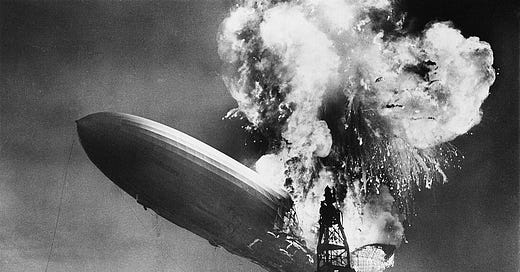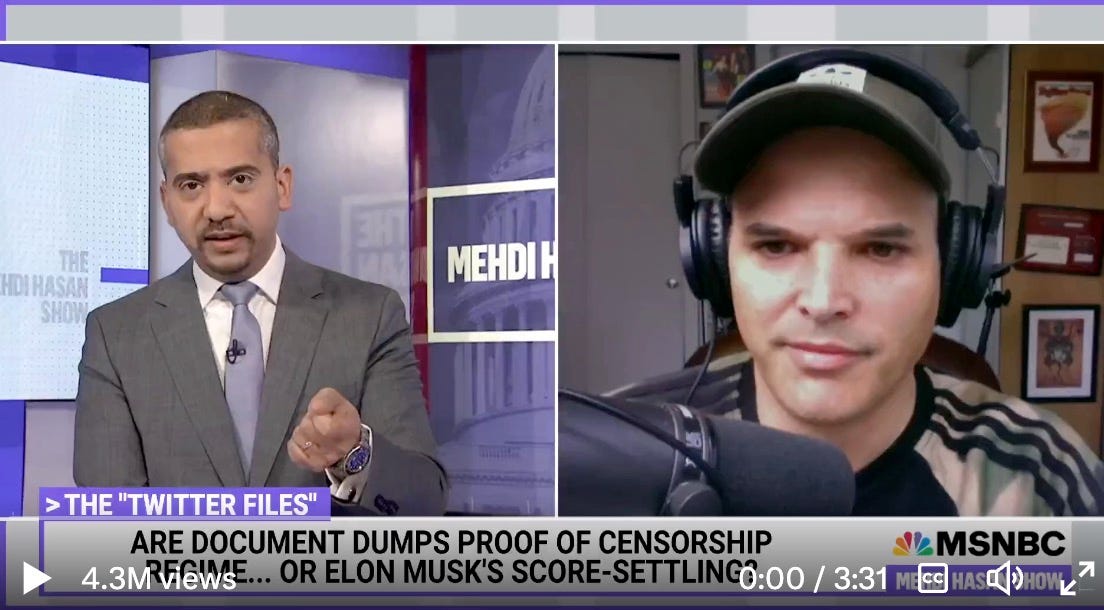Editors note: It seems Elon’s Twitter is blocking engagement with links to Substack hosted content. If you care to share this on Twitter, use this link https://lnk.thebulwark.com/3zGry4P.
Cheers!
Russia-loving, Musk errand boy Matt Taibbi went on Mehdi Hasan’s show this week. Here’s a 3 minute clip.
No más!
Those with a humiliation kink will definitely want to watch the whole thing. Those with weak stomachs should probably pass.
Normally I’d be against this sort of pre-meditated public beat-down. But here’s the thing about Taibbi: If anyone deserves it, it’s him. Because this isn’t the low-point of his career. Heck, this isn’t even his most embarrassing moment of the last year.
Because you may remember Matt Taibbi from such films as
There Will Be No Invasion of Ukraine This Is All a Government Plot and the hit sequel The Invasion of Ukraine Is All the West’s Fault.
Just another brave, anti-woke, tankie truth-teller getting targeted by the dreaded liberal media. Because truly, liberal media bias is the single most important threat facing the world.
PS: If Taibbi had listened to Charlie’s fantastic interview with Hasan a few weeks back, he never would have agreed to go on this show.
2. The Ghost at the Feast
A few weeks ago we ran an excellent review of Robert Kagan’s latest book. It’s called The Ghost at the Feast and it’s about America’s role in world affairs from 1900 to 1941.
Confession: I still haven’t read it. But I listened to Kagan spend an hour talking about the book and history with Bill Kristol and it was one of those paradigm-shift moments for me that changed my way of seeing the world.
I cannot recommend this interview enough. You can watch it here.
Let me give you just one piece of it: Kagan argues—entirely persuasively—that in America, foreign policy is always dictated by domestic politics.
That sounds simple, but it’s unbelievably profound and it’s an indictment of people (like me) who tend to think about foreign policy in geostrategic terms. Because the corollary is that: It does not matter how obviously correct a foreign policy is—it will not be sustainable if voters are complaining about the price of gas.
Kagan argues that this fundamental truth about America is a consequence of simple geography. Since 1900, every war we’ve fought has been a war of choice. Worse: The combination of our geographic impregnability with our economic strength was always fated to make America the indispensable nation—the country which created the strategic balance in every part of the globe.
Listening to Kagan made me deeply concerned about the war in Ukraine. Because ultimately, America’s policy toward Ukraine will be determined not by what is best for America and global stability—but by the extent to which voters are worried about crime, and inflation, and trans athletes in high school.
3. Good Friday
Plough has redefined what a Christian literary magazine can be: It’s one of my favorite magazines, a quarterly that is uncommonly perceptive, thoughtful, and wise. I cannot recommend it enough—especially since a subscription is so reasonable, just $36 a year.
Since it’s Good Friday, I’d like to pass on to you this remarkable essay about losing a friend:
I laid my five-day-old baby down next to Ellen on her hospital bed. Ellen, age eighty-five, had been unresponsive for the past few days, barely eating or drinking. Her room, filled with family, caretakers, flowers, and an overpowering scented candle, seemed almost uncannily peaceful – so different from the happy energy of Ellen’s home on my many previous visits. As I sat next to her bed and held her hand, I reflected on the improbable friendship that had blossomed between my then-teenage self and the remarkable mind now trapped by Alzheimer’s – her helplessness so similar to the helplessness of my newborn daughter.
I was sixteen years old when our paths were placed in each other’s way. Certainly, I was not looking for a friend in her seventies, and she didn’t really need me – her six living children and their families all adored her, and her dozens of grandchildren were constantly visiting. But when she and her husband Ulrich, “Ullu,” who were old friends of my parents, moved into the apartment next to our family, they became part of our daily lives. (In a Bruderhof house, each family has their own apartment, but hall and kitchen space may be shared.) My parents expected my seven older siblings and me to show Ullu and Ellen the same love and respect we gave our grandparents, even if this translated into long Scrabble games on the nights when I had the most homework.
This wasn’t actually much of a hardship: Ellen was terrific company. She loved to laugh, and to laugh with Ellen meant being reduced to helpless wheezing. She was an attentive hostess and conversationalist, brimming with interest in her fellow humans. . . . .
Considering that at the time, I was consumed by all things adolescent (music, novels, boys), it seems odd that Ellen befriended me so quickly, and I am not entirely sure why or when it happened. It may have started when my mom asked me to help Ellen clean her house every Saturday morning. Ellen would watch me work from her rocking chair, and the invariable discussion about what books I was reading made one hour quickly ooze into two. I learned never to walk into her house without an answer prepared for, “So what are you reading now?” and learned also to be prepared to be chastised if I accidentally mentioned the John Grisham novel I had just picked up, or some thrilling romance. “That’s not a book!” she would say with withering disdain, and I would once again be urged to try one of her favorites: War and Peace, The Brothers Karamazov, or Pride and Prejudice (“Someday, you too shall find your own Mr. Darcy,” she would say with a twinkle).
Or it may have begun when I started helping her count out her pills for the week – she had recently been diagnosed with Alzheimer’s on top of her existing health issues, and found sorting the myriad little pills into the pill-counter difficult. Or perhaps it was our weekly outing to the local sauna (according to her, some form of therapy), during which, despite her horrific heart condition, she would plunge into the pond’s icy water on the coldest of winter days. However it happened, Ellen somehow had a way of understanding and listening to a sixteen-year-old who was otherwise quite preoccupied with teenage drama.
Read the whole thing. And have a wonderful, blessed weekend my friends.
I’m grateful, every day, for all of you.







As much as I enjoyed watching Hassan dismantle Taibbi, I wish he talked more about the lies of omission by Taibbi, not just the sloppy mistakes. Sloppy mistakes can be dismissed as honest mistakes. But the lies of omission cannot.
In the very first Twitter files, which was about the decision making process that made Twitter "censor" the NY Post article about Hunter Biden laptop, there was not a single mention of certain important contextual facts in which that decision was made. No mention of the fact that the source of the story was Giuliani, who had torched his credibility, not just by lying for Trump, but by explicitly partnering with (recently indicted, btw) Russian agent Andriy Derkach in order to find dirt on Hunter Biden. In this context, the decision looks much more reasonable, but this context was entirely omitted. It's almost as if Matt was acting as a hired hack with a narrative to push, and not a journalist.
https://www.thedailybeast.com/accused-russian-agent-andriy-derkach-called-rudy-giuliani-very-useful-report-says
Off subject. I just listened to Jeff Sharlet on Charlie’s podcast. I’m 77 and have lived in europe the last 11 years and am out of the loop with US news, but Mr. sharlet’s interview was damn scary about incels and guns. What has happened to my country? These people are forking crazy and very dangerous!